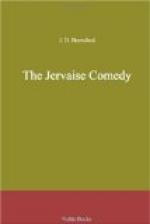I could just see him now, sitting propped against the trunk of another tree, but I waited until he had finished what I chose to believe was the third verse of his lyric before I hailed him. It came to me that I might test his quality by continuing the play in proper form, so when he paused, I went on with the speech of the “host” which immediately follows the song in “The Two Gentlemen of Verona.”
“How now?” I said. “Are you sadder than you were before?”
He did not move, not even to turn his head towards me, and I inferred that he was aware of my presence before I spoke.
“You, one of the search party?” he asked.
I went over and sat down by him. I felt that the situation was sufficiently fantastic to permit of free speech. I did not know who he was and I did not care. I only knew that I wanted to deliver myself of the dreams my lack of sleep had robbed from me.
“The only one,” I said, “unless you also belong to the very small and select party of searchers.”
I fancy that he turned his head a little towards me, but I kept my gaze fixed on the indigo masses of the obscure prospect before us.
“Who are you looking for?” he asked.
“Not so much who as what,” I said. “And even then it isn’t so easy to define. I’ve heard men call it beauty and mystery, and things like that; but just now it seemed to me that what I wanted most was a universal miracle—some really inexplicable happening that would upset every law the physicists have ever stated. I was thinking, for instance, how thrilling it would be if the sun did not rise this morning. One would know, then, that all our scientific guesses at laws were just so many baby speculations founded on nothing more substantial than a few thousand years of experience which had, by some chance given always more or less the same results. Like a long run on the red, you know.”
“I know,” he said. “Well? Go on.”
I was greatly stimulated by his encouragement. Here, at last, was the listener I had been waiting for all through the night.




